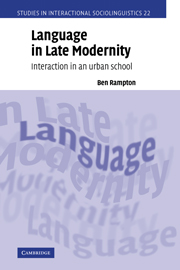Book contents
- Frontmatter
- Contents
- List of tables
- List of figures
- Acknowledgements
- Transcription conventions
- Part I Introduction
- Part II Urban classroom discourse
- Part III Performances of Deutsch
- Part IV The stylisation of social class
- 6 Language and class I: theoretical orientations
- 7 Language and class II: empirical preliminaries
- 8 Schooling, class and stylisation
- 9 Classed subjectivities in interaction
- Part V Methodological reflections
- References
- Index of names
- Subject index
8 - Schooling, class and stylisation
Published online by Cambridge University Press: 22 September 2009
- Frontmatter
- Contents
- List of tables
- List of figures
- Acknowledgements
- Transcription conventions
- Part I Introduction
- Part II Urban classroom discourse
- Part III Performances of Deutsch
- Part IV The stylisation of social class
- 6 Language and class I: theoretical orientations
- 7 Language and class II: empirical preliminaries
- 8 Schooling, class and stylisation
- 9 Classed subjectivities in interaction
- Part V Methodological reflections
- References
- Index of names
- Subject index
Summary
Schooling involves rewards and penalties, reputations and identities, that can be very consequential for students' future position within systems of production, distribution and consumption, and as such it has often been associated with social class (e.g. Bourdieu and Passeron 1977). Pupil–teacher interaction is often fraught with institutional power-conflicts, and it can be a major site for the formation and the display of class consciousness (Willis 1977). So how did stylisations of posh and Cockney feature in the schooling process, when talk was focused on school tasks, or when teachers were salient, either as interlocutors or as the topics of discussion? What part did stylised posh and Cockney play in scenes where there were institutional rewards and penalties at stake, and how did they fit into the negotiation of official classifications and requirements? And within this, what kinds of politics did stylisation seem to be associated with – what aspirations, solidarities or oppositions?
These are the basic descriptive and interpretive issues addressed in this chapter, drawing on a corpus of about 20–25 episodes. But I shall link the analysis to more general debates about the educational treatment of non-standard speech. Since the 1970s, sociolinguists have claimed that if schools are insensitive in their promotion of standard English, they are likely to produce (a potentially debilitating) linguistic insecurity among their working-class pupils.
- Type
- Chapter
- Information
- Language in Late ModernityInteraction in an Urban School, pp. 269 - 324Publisher: Cambridge University PressPrint publication year: 2006



